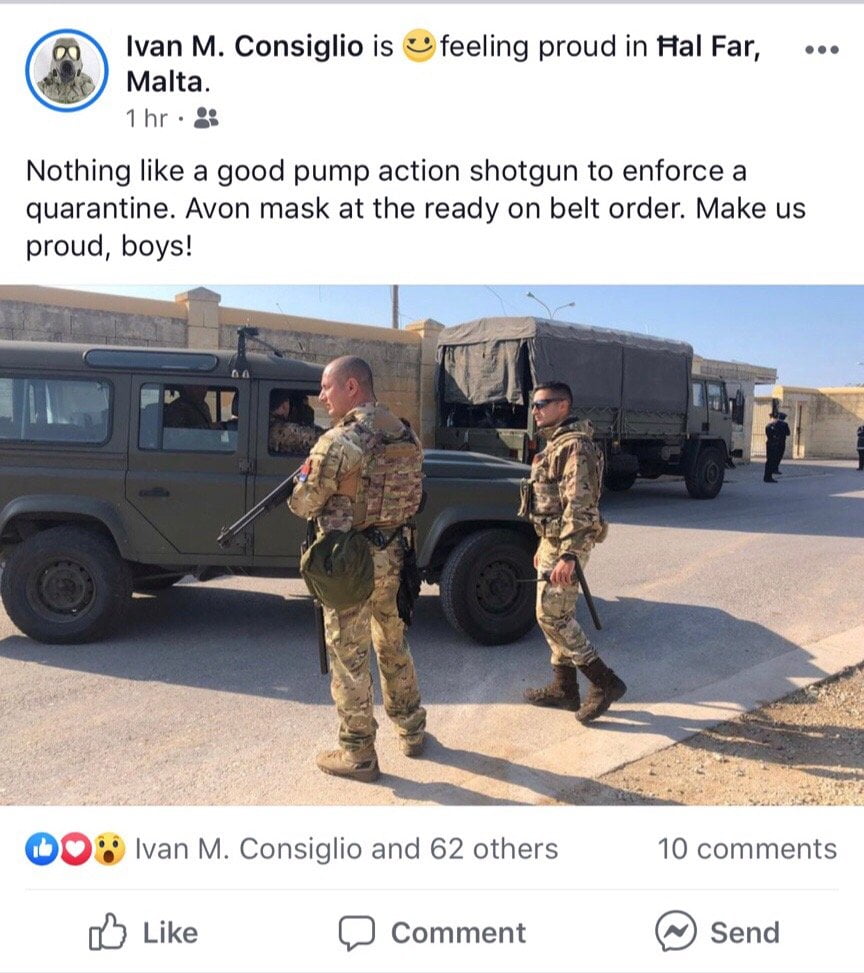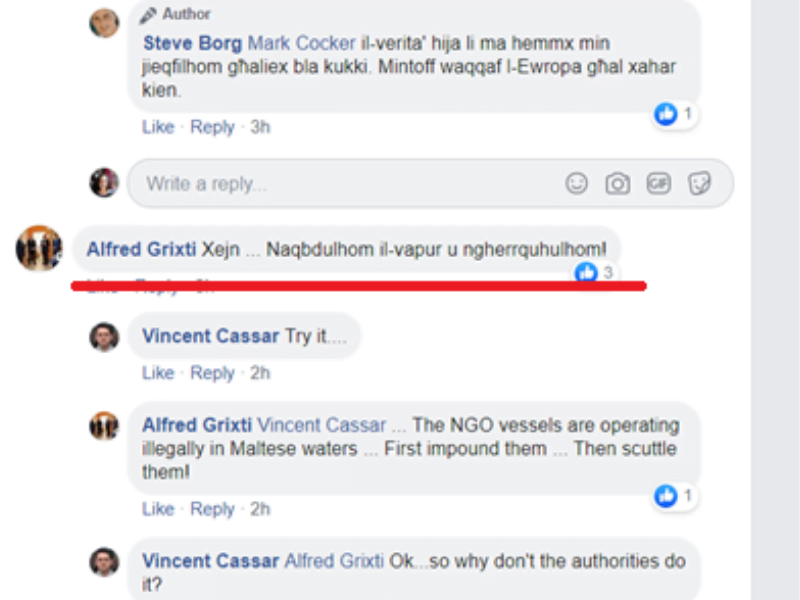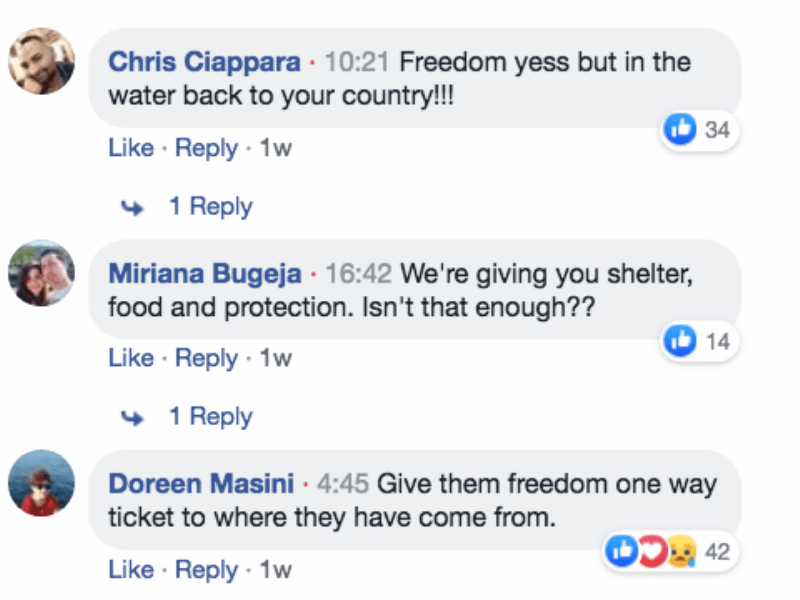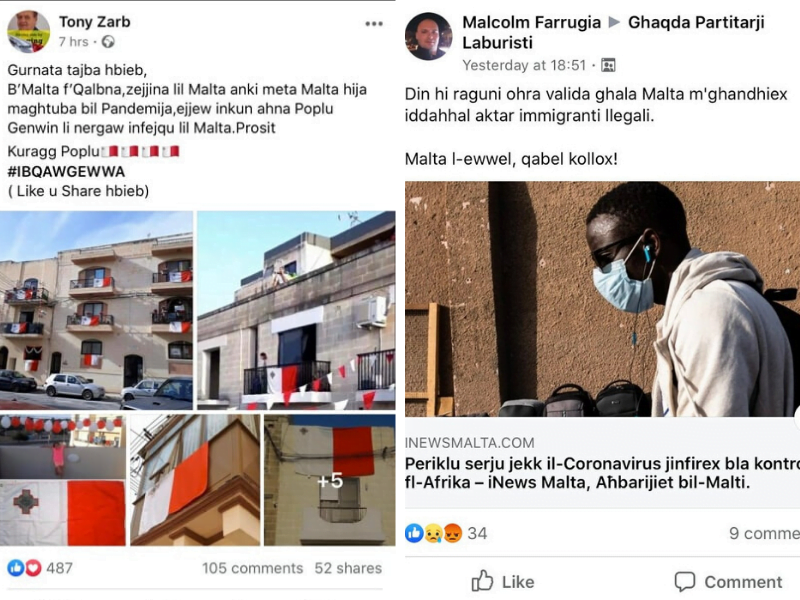Online hate has surfaced repeatedly over the past few weeks, triggered by posts published by public figures which fuelled the sentiment to support Labour Leader Robert Abela, after he set the tone that citizens either supported his stand to close the ports to migrants or they stood with ‘the enemy’.
The government made two controversial decisions on migrants during the pandemic that were met with uproar from human rights NGOs.
The first decision was to lockdown the Hal Far Open Centre after eight of its residents tested positive for the virus. Health Minister Chris Fearne had insisted that the lockdown was not about racial discrimination and that everyone who tested positive had to be quarantined, as did those around them.
Yet, the action taken on migrants infected stood in stark contrast to orders on other citizens. After the lockdown on the migrant centre was announced, the Armed Forces of Malta (AFM) and police officers were promptly deployed to guard the centre, within which approximately 1,000 individuals reside in confined spaces.
The move drew the attention of many – especially since it coincided with the one-year anniversary of the murder of Ivorian migrant Lassane Cisse Souleymane, for which two AFM soldiers have been charged with murder after he was shot down in the dark while walking back to the open centre.
While some criticised the lockdown and strong enforcement on the migrant centre, others praised the move and cheered on the army.
Former AFM spokesperson and retired Major Ivan Consiglio was among them: “Nothing like a good pump-action shotgun to enforce a quarantine. Avon mask at the ready on belt order. Make us proud, boys.”

When questioned about his post by The Shift, Consiglio said he did not believe it had any racist undertones, arguing that the presence of ammunition was “routine law enforcement” and that a pump-action shotgun was non-lethal ammunition.
Asked whether such a heavy presence was necessary, Consiglio said the migrants were in a confined space and, due to their circumstances, may have their stress “exasperated to a larger degree”.
Soon after defending his post in comments to The Shift, he deleted it. He then went on to write another saying it was a “pity” that someone who did not agree with him went to a news portal instead of “telling (him) that they disagree”.
Messages of solidarity rushed in, many from those with apparent links to the army. One reiterated that such ammunition is the only way to make sure “these people” obey orders. “Now let’s just wait for the complaints from our bleeding hearted NGOs,” he said.
“Calling me a racist gave me pride in what I did to preserve our national identity,” said another.
Days following the closure of the Hal Far centre, Malta followed Italy in closing its ports, disallowing migrants stranded at sea to make way to Malta’s shores for refuge. People have died as a result.
This was no deterrent for the CEO of Foundation for Social Welfare Services, Alfred Grixti, who said in a Facebook post that the government should “impound rescue vessels and scuttle them”.
His comments led to calls for his resignation from a number of NGOs and other entities, with the FSWS even distancing itself from the comment. But Grixti did not budge.

As has happened with countless other cases under this adminstration, Social Solidarity Minister Michael Falzon said the comment was made in Grixti’s individual capacity, saying he “felt that he was misunderstood”.
While Falzon failed to condemn such language, Economy Minister Silvio Schembri fuelled it. Schembri declared in parliament that foreigners who lose their jobs during the COVID-19 crisis will have to “go back home”.
“Charity begins at home; our main focus is Maltese workers,” he had said. His comment was met with sheer disbelief by the foreign community in Malta. He has since backtracked.
Another comment slammed for prompting racism was posted by Labour Party media ONE TV presenter Manuel Micallef, who wrote a post on Facebook that asked the public whether, in an emergency situation within the COVID-19 outbreak, an “African immigrant” should be given the last ventilator at the hospital, as opposed to a Maltese citizen.
After he was called out, he argued that he didn’t mean to “incite racism” and removed the post.
Shortly after a petition launched by members of civil society garnered over 4,000 signatures, appealing to Abela to re-open the ports to save people in distress on board a vessel outside Malta on Easter Sunday, a counter-petition was launched appealing to keep the ports closed.
Hours into the day, migrants on one of those boats were reported dead, while the 51 surviving passengers on the vessel were returned to Libya.
All this while a constant wave of xenophobic comments became daily occurrences under news articles on the topic. A protest initiated by migrants at the Lyster detention centre a few days after the news of the deaths, was met with yet another wave of racist comments by members of the public.
The videos portrayed a rare glimpse of the detention centre, where migrants were crammed in barred windows, raising questions as to how many people live in the centre, a place which is inaccessible to journalists and photographers.

Although government officials have acknowledged the increase in racist speech, they have yet to clearly and strongly condemn such behaviour, and specifically, denounce comments made by public persons.
Foreign Affairs Minister Evarist Bartolo acknowledged the language in parliament, saying that we must “stop racism in Malta, and certain people should not speak in such a manner about the lives of others”.
Yet in a series on posts on Facebook, Bartolo has served to fuel that sentiment. He has justified closing off Malta’s ports, arguing that the country has already done more than enough to help migrants and has asked the EU to help with aid to Libya to curb the situation.
Similarly, Prime Minister Robert Abela condemned racist comments during an interview on Labour Party media. “I disapprove of words which have racial sentiment or hatred, we are not a population that associates itself with racial hatred,” he said, after also defending the decision to close the ports.
In this slight show of force against migration, Abela pushed the message of patriotism with the ‘Malta first and above all else’ message. It incited more xenophobic language.

Facebook posts displaying the encouragement of patriotism and its link to racist diction.
Abela even called a press conference to accuse civil society NGO Repubblika of putting the country at risk by filing two criminal complaints stating that Abela, the Army commander and 11 soldiers were responsible for the death of 12 migrants at sea.
The Maltese branch of the Association for Child and Adolescent Mental Health (ACAMH) expressed its concern over the language used on social media.
“By refusing to help those in need, and by propagating a discourse which is stereotypical, xenophobic and demeaning towards members of other ethnicities, we are inadvertently influencing our younger generations’ perspectives towards cultural diversity.”












